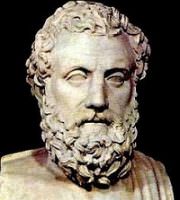About Aeschylus
Aeschylus was an ancient greek epic poet and tragedian. He is also the first whose plays still survive; the others are Sophocles and Euripides. He is often described as the father of tragedy critics and scholars' knowledge of the genre begins with his work, and understanding of earlier tragedies is largely based on inferences from his surviving plays. According to Aristotle, he expanded the number of characters in plays to allow conflict among them whereas characters previously had interacted only with the chorus. So important was the war to Aeschylus and the Greeks that, upon his death, around 456 BC, his epitaph commemorated his participation in the Greek victory at Marathon rather than his success as a playwright. Here are some of his best poetry works translated from greek.Browse all poems and texts published on Aeschylus
Beneath this stone lies Aeschylus, son of Euphorion, the Athenian, who perished in the wheat-bearing land of Gela; of his noble prowess the grove of Marathon can speak, and the long-haired Persian knows it well.









